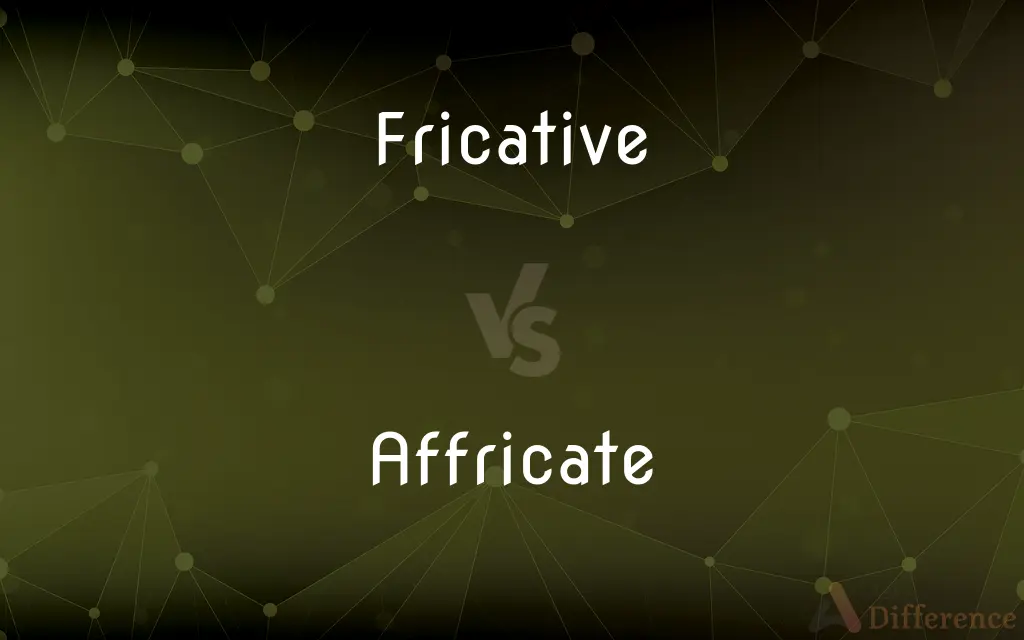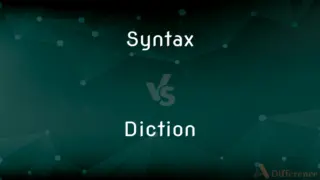Fricative vs. Affricate — What's the Difference?
Edited by Tayyaba Rehman — By Fiza Rafique — Updated on September 30, 2023
Fricatives are consonants produced by forcing air through a narrow channel, like "f" in "fish". Affricates start with a stop and release into a fricative, like "ch" in "chair". Both are speech sounds, but they are produced differently.

Difference Between Fricative and Affricate
Table of Contents
ADVERTISEMENT
Key Differences
In the realm of phonetics, both fricatives and affricates are integral to our understanding of speech sounds. A fricative is a consonant sound where the airflow is partially obstructed, creating a friction-like sound. The sounds of "v" in "voice" and "th" in "thing" are examples of fricatives.
An affricate, on the other hand, is slightly more complex. It begins with a complete stop of the airflow, akin to plosive consonants, and then releases into a fricative sound. The combination of these two processes gives rise to sounds like "ch" in "chocolate" and "j" in "judge.
While both fricatives and affricates involve constriction in the vocal tract, the key difference lies in their manner of articulation. Fricatives maintain a steady, narrow constriction, whereas affricates involve a dynamic change from total occlusion to a fricative release.
Comparison Chart
Definition
Consonant with narrow airflow constriction
Begins with a stop and releases into a fricative
Manner of Articulation
Steady, narrow constriction
Initial occlusion followed by fricative release
ADVERTISEMENT
Acoustic Properties
Prolonged, hissing sound
Abrupt onset due to initial stop
Examples
"f" in "fish", "s" in "snake"
"ch" in "chair", "j" in "judge"
Occurrence in English Language
Common in many words
Less frequent than fricatives but still prevalent
Compare with Definitions
Fricative
A consonant sound produced with a narrow airflow constriction.
The sound f in flute is a fricative.
Affricate
A consonant involving a stop closure followed by a fricative release.
Tch in watch is an example of an affricate.
Fricative
A consonant where breath is partially blocked, causing turbulence.
Z in zebra is a voiced fricative.
Affricate
A complex speech sound combining two distinct articulatory processes.
J in jump represents a voiced affricate.
Fricative
A speech sound with persistent air passage, causing hiss or buzz.
Th in bath illustrates a voiceless fricative.
Affricate
A unique consonant category with a dynamic manner of articulation.
Ts in tsunami is an affricate in some languages.
Fricative
A consonant category with a consistent and narrow constriction.
The sound v in vase is a fricative.
Affricate
A consonant that begins as a stop and transitions to a fricative.
The sound ch in cheese is an affricate.
Fricative
A sound characterized by friction-like airflow in the vocal tract.
The sh in shoe is an example of a fricative.
Affricate
A hybrid speech sound merging characteristics of stops and fricatives.
The j sound in giraffe is an affricate in some dialects.
Fricative
Fricatives are consonants produced by forcing air through a narrow channel made by placing two articulators close together. These may be the lower lip against the upper teeth, in the case of [f]; the back of the tongue against the soft palate, in the case of German [x] (the final consonant of Bach); or the side of the tongue against the molars, in the case of Welsh [ɬ] (appearing twice in the name Llanelli).
Affricate
An affricate is a consonant that begins as a stop and releases as a fricative, generally with the same place of articulation (most often coronal). It is often difficult to decide if a stop and fricative form a single phoneme or a consonant pair.
Fricative
A consonant, such as f or s in English, produced by the forcing of breath through a constricted passage. Also called spirant.
Affricate
A complex speech sound consisting of a stop consonant followed by a fricative; for example, the initial sounds of child and joy. Also called affricative.
Fricative
Of, relating to, or being a fricative consonant.
Affricate
(phonetics) A sound produced using a combination of a plosive and a fricative.
Fricative
(phonetics) Any of several sounds produced by air flowing through a constriction in the oral cavity and typically producing a sibilant, hissing, or buzzing quality; a fricative consonant.
Affricate
(transitive) To produce (a plosive) as an affricate.
Fricative
(phonetics) produced by air flowing through a restriction in the oral cavity.
Affricate
A combination of a stop, or explosive, with an immediately following fricative or spirant of corresponding organic position, as pf in german Pfeffer, pepper, z (= ts) in German Zeit, time.
Fricative
Produced by the friction or rustling of the breath, intonated or unintonated, through a narrow opening between two of the mouth organs; uttered through a close approach, but not with a complete closure, of the organs of articulation, and hence capable of being continued or prolonged; - said of certain consonantal sounds, as f, v, s, z, etc.
Affricate
A composite speech sound consisting of a stop and a fricative articulated at the same point (as `ch' in `chair' and `j' in `joy')
Fricative
A continuant consonant produced by breath moving against a narrowing of the vocal tract
Fricative
Of speech sounds produced by forcing air through a constricted passage (as `f', `s', `z', or `th' in both `thin' and `then')
Common Curiosities
What's a common example of a fricative?
The sound "s" in "snake" is a fricative.
Are affricates a blend of two sounds?
Yes, affricates start with a stop and transition into a fricative.
What distinguishes an affricate from a simple stop?
An affricate releases into a fricative, unlike a stop.
Do all languages have both fricatives and affricates?
Most languages have fricatives, but not all have affricates.
Are fricatives voiced or voiceless?
Fricatives can be both, like "f" (voiceless) and "v" (voiced).
Are there voiced and voiceless affricates?
Yes, "ch" in "chop" is voiceless, while "j" in "judge" is voiced.
Is the sound "th" a fricative?
Yes, both "th" in "thing" and "this" are fricatives.
What's the main difference in producing fricatives and affricates?
Fricatives maintain airflow constriction, while affricates transition from a stop to a fricative.
Can a single word have both a fricative and an affricate?
Yes, "church" has the fricative "r" and the affricate "ch".
Why are fricatives named so?
They're named for the friction-like sound they produce.
Which is harder for children to pronounce, fricatives or affricates?
Both can be challenging, but affricates might be trickier due to their complex nature.
How are affricates produced?
By combining a stop's closure with a fricative's airflow release.
Are affricates common in English?
They're less frequent than fricatives but still prevalent, like "ch" in "church".
Do affricates occur at the start, middle, or end of words?
They can appear in any position, depending on the language.
Are there languages without fricatives?
Rare, but some languages might lack certain fricatives.
Share Your Discovery

Previous Comparison
Poaching vs. Boiling
Next Comparison
Syntax vs. DictionAuthor Spotlight
Written by
Fiza RafiqueFiza Rafique is a skilled content writer at AskDifference.com, where she meticulously refines and enhances written pieces. Drawing from her vast editorial expertise, Fiza ensures clarity, accuracy, and precision in every article. Passionate about language, she continually seeks to elevate the quality of content for readers worldwide.
Edited by
Tayyaba RehmanTayyaba Rehman is a distinguished writer, currently serving as a primary contributor to askdifference.com. As a researcher in semantics and etymology, Tayyaba's passion for the complexity of languages and their distinctions has found a perfect home on the platform. Tayyaba delves into the intricacies of language, distinguishing between commonly confused words and phrases, thereby providing clarity for readers worldwide.














































